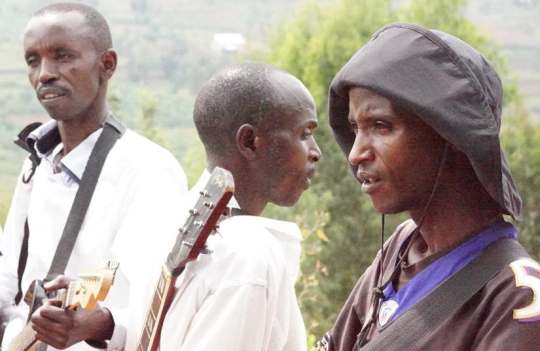|
To listen to this record is to experience the redemption that follows heartbreak. There’s a slight creak in the harmony vocals, a sense of the forlorn in the acoustic guitars. It’s music of endless depth, something that bears witness to not only tragedy but the hope that follows. And because the lyrics are sung in various dialects not widely spoken, it’s easy to imagine the lyrics telling of hard won battles, sufferings overcome, obscure pathways to enlightenment, or long lost, forbidden lovers reunited after years of anguish. In short, it’s probably some of the most beautiful music to emerge from Rwanda, which says a lot, as there’s a lot of beautiful music from Rwanda.
The Good Ones are a trio of genocide survivors and farmers, made up equally of Hutu, Tutsi, and Abatwa, who first learned music in the late 1970s, as children, from current member Janvier Havugimana’s older brother, a musician who died in the 1994 genocide. This record was recorded at member Adrien Kazigira’s farm, where he once hid in the trees for months during the genocide. Rwanda is lush, forested, with lots of hills. It’s as beautiful a place as any on earth, and it’s also a place where many, including the musicians here, live without running water or electricity, where sometimes, despite being farmers, feeding their families is tricky. These are not conditions unique to this region, as we know, but it certainly informs their music; their percussion instruments are modified farm tools, for example. But with help from Ian Brennan, attention from musicians around the world and a brief US tour in the fall of 2019, they’re getting the recognition such music deserves. And on this record, which was otherwise recorded live, they’ve received added sonic assistance from the likes of Keven Shields, Nels Cline, and Corin Tucker.
Picking highlights is impossible. But “Where Did You Go Wrong, My Love?” with the addition of Cline’s guitar, is nearly a modal Appalachian ballad, or so it would seem, the lyrics harmonized over a rolling, foreboding guitar line. There’s the much more upbeat track “A Long, Sad Journey Watching You Die,” which all-but-bounces over a repeated guitar line and metallic percussion. Backing vocalist Javon Mahoro gets a guitar and vocal solo spot on “Life is Hard,” a track that, sung in English, could easily be mistaken for a cowboy lament sung to nobody across an uninterrupted expanse. Finally, “Seraphinne, You are the Prettiest Girl in the World,” finds the three harmonizing over only hand-hit percussion, breaking up the somber mood, feeling almost celebratory for just over a minute.
These are songs written by Kazigira, some of them a response to concerns over a life-threatening tumor on his daughter’s eye, all of them beautiful beyond anything most of us can otherwise imagine. - Bruce Miller
|
